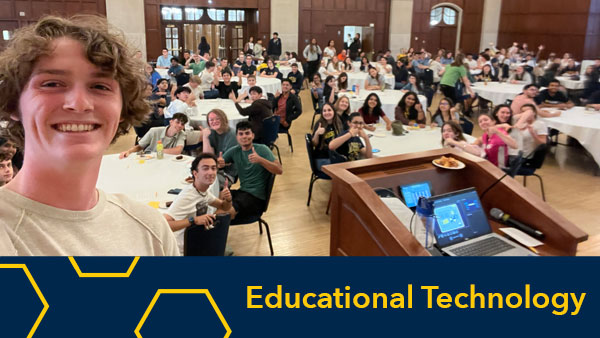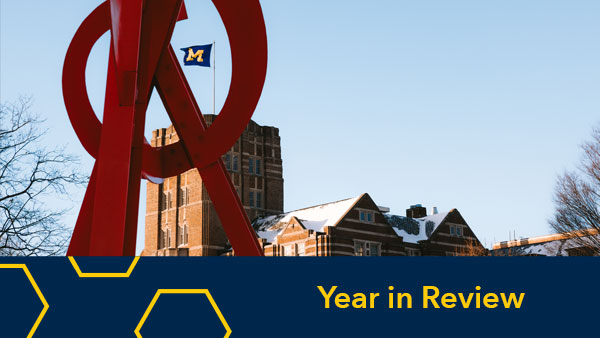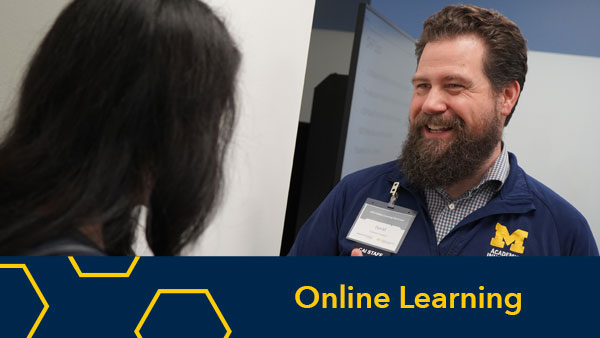This article originally appeared in Inside Higher Ed on April 16, 2020.
Elyse L Aurbach, Public Engagement Lead, Center for Academic Innovation
@ElyseTheGeek
James DeVaney, Associate Vice Provost for Academic Innovation and the Founding Executive Director of the Center for Academic Innovation
@DeVaneyGoBlue
The last few weeks have truly been an exercise in holding space for concurrent dualities, as we have borne witness to both great suffering and unflinching compassion, intense individualism and collective sacrifice, and profound anxiety and deep gratitude.
This sense of dualism is also at play in public engagement spaces within and beyond the academy. In trying times, it is especially critical that we continue to create and maintain effective dialogues between scholars and communities in order to generate equitable and sustainable solutions to the problems that matter most.
Our objective in writing this post is to reflect on the continued importance of public engagement in the current moment and to highlight the unique challenges communities face during a time of crisis. By sharing these examples of effective public engagement – as well as new efforts to build capacity for even greater transformation – we hope to learn from this moment and reflect on ways that universities can support this critical work.
The academic community is rallying to meet the crisis with waves of new research and creativity in engaging with different publics; public scholars have recognized and acted upon myriad opportunities during the pandemic. There have been outstanding examples of researchers engaging with media professionals to share expertise and shape stories, and interest in writing op-eds or for outlets like The Conversation is incredibly high. Opportunities to participate in research on SARS-CoV-2 or work with researchers to co-design possible antivirals are expanding rapidly. Demand for online teaching and learning is spiking, and universities and other organizations are producing just-in-time learning opportunities addressing the novel coronavirus or sharing fun experiences for kids and families at home.
At the same time, community partners who work with academic scholars are experiencing huge impacts, and few have the same security that the shelter of a university offers. Zoos, museums, and other spaces for informal learning are shuttered and have been forced to furlough or lay off workforces. Schools are closed for the year. Non-profit organizations – especially those focused on alleviating poverty, housing, and food insecurity – are working to survive and hold the line. And engagement opportunities relying on virtual tools and environments underscore access disparities to technology and the internet, widening existing gaps which disproportionately affect people who are poor and people of color.
It is in this dual reality of intense struggle and remarkable human accomplishment where the importance and value of public engagement efforts become even more clear. Heartbreakingly, sometimes the communities with the greatest capacity to understand problems – especially through lived experience and other ways of knowing which aren’t rooted in academic expertise – are the most strained on the front-lines of crisis. Therefore the time of COVID-19 reinforces the responsibility and trust that institutions of higher education – especially public research universities – hold in serving the public good. Such institutions have much greater capacity to weather these trying times. We must leverage our relative stability and unique strengths and take active steps to be of service to our communities.
One way that the University of Michigan is meeting this charge is through a new Public Engagement Faculty Fellowship program. Although we had begun planning this Fellowship before COVID-19, our current situation highlights how important programs like these are in preparing scholars for engagement – both in moments of crisis and over the long-term.
Working in partnership with units across campus, the Center for Academic Innovation recently named 18 faculty fellows to the inaugural cohort of the Fellowship program. The cohort represents eleven campus units, including scholars from STEM, social sciences, humanities, and the arts.
The Public Engagement Faculty Fellowship aims to achieve a number of important goals. Working to meet U-M President Mark Schlissel’s charge to expand our public purpose, we hope to bring more faculty into public engagement and create new ways of increasing the impact of scholarship. We hope to support needs articulated by faculty and create opportunities to build skills, launch new public engagement projects, and develop an interdisciplinary and intergenerational learning community of engaged scholars. And we hope to elevate the value of all forms of ethical, effective public engagement – regardless of context, partner, or audience.
During the Fellowship, an early “Studio Experience” will introduce the cohort to experts representing the breadth of opportunities available in public engagement. They will complete workshops supporting skill development and gain greater familiarity with on- and off-campus resources. They will participate in a learning community and receive focused mentorship. They will develop two small public communication projects, including a written piece for a public audience and a short video explainer about their work. And they will consult one-on-one with campus experts to scope and plan projects. After successful completion of the Studio Experience, Fellows will have opportunities to further develop their engagement work.
We partnered closely with public engagement units from across U-M’s campus and special guests to collaboratively design the Faculty Fellowship. In this way, we hope to leverage the deep expertise on campus, support all forms of innovative engagement work, and build bridges across different public engagement spaces in our community. The program is also advised on an ongoing basis by an interdisciplinary group of publicly-engaged faculty.
Like all other planned programming at the University of Michigan, the Fellowship will be shifting gears in order to appropriately respond to the public health concerns posed by COVID-19. The Studio Experience is moving online, and all connections between faculty and expert campus staff will be made virtually rather than in person. With this shift comes opportunities to stretch, apply best practices in online learning to capacity-building in public engagement, and learn from colleagues well-skilled in leveraging virtual technology for participatory action.
In addition, the pandemic – including all the associated challenges and opportunities – will become an anchor for the cohort’s reflective practice throughout the experience. We hope that continuing to offer this experience for Fellows during the time of COVID-19 will reinforce core tenets of ethical engagement work, including recognition, respect, and equitable partnership, and reinforce the need to be of service and to partner in mutually-beneficial ways with our communities in the times ahead.
Michigan is not alone in expanding public engagement efforts. Northwestern University just released a timely online course on science communication, which could help combat the spread of misinformation. Stanford University has launched a national daily survey to bolster real-time data collection related to the pandemic and is supporting a creative response grant to foster community connections using art. Duke University is hosting open webinars that bring together academics, policymakers, journalists, and others to discuss the pandemic in the “Coronavirus Conversations.” And universities around the world are partnering tightly with healthcare providers to aid in the medical response.
We’ve highlighted just a few ways that the academic community continues to engage in important public engagement work. Certainly there are many more. There is also more work to be done – especially in the context of supporting scholars and community partners to be able to pursue this work sustainably and equitably.
- How might institutions of higher education learn from the current moment – especially in how they value products of engagement work that aren’t rooted in grants and publications?
- What infrastructure and policies are necessary to institutionalize a commitment to respectful and equitable engagement, including honoring the expertise and compensating the efforts of long-time public partners? How might such a commitment extend the shelter of the university to our communities during times of crisis?
- How might universities help to address disparities to accessing much of the public engagement effort currently requiring a device and internet connection?
- Which other capacity building initiatives like U-M’s Public Engagement Faculty Fellowship might provide important catalysts for institutional change?
- What other opportunities do you see to strengthen or support public engagement in a time of crisis?
The duality of this crisis truly poses an opportunity for all of us to reflect on the multiple roles we occupy and the communities of which we are members – both within and beyond institutions of higher learning. We hope to learn from this moment and use these lessons to build towards a more resilient future.


